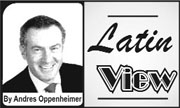Judging from Venezuela’s leftist regime’s past behaviour, its reaction to a likely defeat in Sunday’s crucial legislative elections may be to stage a slow-motion post-election coup once international attention shifts away from the country in coming weeks.
Except that this time, President Nicolas Maduro may not get away with it as easily as in the past. With a collapsing economy, the world’s highest inflation rate, and a much less friendly international environment, these elections could mark the beginning of the end of one of the most corrupt and inept governments in the region.
 Public opinion polls by Datanalisis, Venebarometro and other polling firms that in the past predicted victories by late President Hugo Chavez and Maduro, his successor, agreed that the opposition MUD coalition was about 30 percentage points ahead of the government in the last pre-election polls.
Public opinion polls by Datanalisis, Venebarometro and other polling firms that in the past predicted victories by late President Hugo Chavez and Maduro, his successor, agreed that the opposition MUD coalition was about 30 percentage points ahead of the government in the last pre-election polls.
Despite the fact that this was the most anti-democratic election process in South America’s recent history — in addition to the arbitrary imprisonment of leading opposition figures and widespread press controls, the regime’s election rules will allow sparsely populated pro-government states to elect more legislators than huge states with opposition majorities — the opposition was leading in public opinion polls even in heavily “Chavista” states.
If the Maduro regime ends up accepting a defeat in the polls, it wouldn’t be the first time that it does so, but only to rewrite the laws shortly thereafter and strip the opposition of its democratically won political gains.
Consider what happened in 2008, when opposition leader Antonio Ledezma won the elections for mayor of Caracas, the capital. It was the most important job after the president’s, and it was hailed as a huge victory for the opposition.
But shortly thereafter, the Chavez-controlled National Assembly announced the creation of a new “Capital District” to run the city. It appointed a Chavez loyalist to head the new city government, and transferred most of the Caracas’ mayoral office’s budget to the newly created city government.
Ledezma went on a hunger strike and drew some international attention, but most of the region’s governments looked the other way. Soon, the world forgot about the whole issue.
The Maduro regime may try to do something similar if the opposition wins a majority in the National Assembly: it may create a new legislative institution to supersede or replace the current congress. There is already a law in place that would allow Maduro to try to do that, Venezuelan opposition sources tell me.
In 2010, Chavez passed what is known as the “People’s Power law,” which calls for creation of a Cuban-style election system. Under the law, Venezuela would create 18,000 “communes” to “exercise direct power.”
At the time, nobody paid much attention, mainly because it sounded too far-fetched. But the law is in place, and could be used by Maduro to circumvent the National Assembly with a new government-controlled legislative body.
My opinion: Maduro may accept a defeat — like Chavez did after a 2007 referendum — and wait a few weeks before striking back.
He may first try to buy off opposition legislators or create bogus charges to expel others in order to retain control of the National Assembly. And if that fails, he may resort to the “People’s Power law” and create a new “People’s National Assembly.”
But this time, the odds are against him: his popularity at home has plummeted, and he has no more petro-dollars to buy the support of foreign governments.
Unlike in past elections, Organization of American States secretary general Luis Almagro, Argentina’s President-elect Mauricio Macri, Spain’s Prime Minister Mariano Rajoy and British Prime Minister David Cameron, among others, are already denouncing Venezuela’s lack of compliance with regional treaties calling for adherence to democratic principles.
Now, the key will be pressing Brazil — in the midst of a major political and economic crisis — and other countries in the region not to condone a slow-motion post-election coup in Venezuela, as they did in the past. It’s time for Latin America’s diplomatic community to stop behaving like a mutual protection society for repressive regimes.








